- Home
- Neal Shusterman
Scythe Page 21
Scythe Read online
Page 21
Scythe Volta, though, was different. Yes, he stormed the office building and gleaned his share, just as the others had, but he said little as their god-machine carried them home across the sky. And now at dinner, he barely touched the food on his plate. He kept getting up to wash his hands. He probably thought nobody noticed, but Rowan did. And so did Esme.
“Scythe Volta is always cranky after a gleaning,” Esme leaned over to tell Rowan. “Don’t stare at him, or he’ll throw something at you.”
Halfway through dinner, Goddard asked for a final count.
“We gleaned two hundred sixty-three,” Rand told him. “We’re ahead of our quota now. We’ll have to glean fewer next time.”
Goddard slammed his fist down on the table in disgust. “The damn quota hobbles us all! If it weren’t for the quota, every day could be like today.” Then Goddard turned to Scythe Volta and asked how his task was coming. It was Volta’s job to set appointments with the families of the deceased, so that they could be granted the obligatory immunity.
“I’ve spent the whole day reaching out to each family,” Volta said. “They’ll be lining up at the outer gate first thing tomorrow morning.”
“We should let them onto the grounds,” Goddard said with a smirk. “They can watch Rowan train on the lawn.”
“I hate the bereaved,” Rand said, as she stabbed a fresh piece of meat with her fork and dragged it to her plate. “They always have such awful oral hygiene—my ring always reeks after an hour of granting bereavement immunity.”
Unable to stomach any more, Rowan excused himself. “I promised Esme I’d play cards with her after dinner, and it’s getting late.” There was no truth in that, but he threw a glance to Esme and she nodded, pleased to be part of an impromptu conspiracy.
“But you’ll miss the crème brûlée,” said Goddard.
“More for us,” said Chomsky, shoving a forkful of prime rib into his maw.
Rowan and Esme went to the game room and played gin rummy, mercifully undisturbed by talk of gleaning and quotas and the kissing of rings. Rowan was thankful that the suicide king held the monopoly on misery in this room.
“We should get others to join us,” Esme suggested. “Then we can play hearts or spades. You can’t play those games with just two.”
“I have no interest in playing cards with the scythes,” Rowan told her flatly.
“Not them, silly—I mean the servants.” She picked up his discarded nine—the second one he fed to her, as if he didn’t know she was collecting them. Letting her win today was payment for helping him escape the dining room.
“I play cards with the pool man’s sons sometimes,” she told him. “But they don’t like me very much on account of this used to be their house. Now they all share a room in the servant’s quarters.” Then she added, “You’re sleeping in one of their rooms, you know. So I’ll bet they don’t like you much, either.”
“I’m sure they don’t like any of us.”
“Probably not.”
Maybe it was because Esme was young, but she seemed entirely oblivious to the things that weighed so heavily on Rowan. Perhaps she knew better than to question things, or to pass judgment on what she saw. She accepted her situation at face value, and never spoke ill of her benefactor—or more accurately, her captor, for she was clearly Goddard’s prisoner, even though she might not see it that way. Hers was a gilded cage, but it was a cage nonetheless. Still, her ignorance was her bliss, and Rowan decided not to shatter her illusion that she was free.
Rowan picked up an ace, which he needed for his hand, but discarded it anyway. “Does Goddard ever talk to you?” He asked Esme.
“Of course he talks to me,” she said. “He’s always asking me how I am, and if there’s anything I need. And if there is, he always makes sure I get it. Just last week I asked for a—”
“—No, not that kind of talking,” said Rowan, cutting her off. “I mean real talking. Has he ever hinted as to why you matter so much to him?”
Esme didn’t answer. Instead she lay down her cards. Nines over threes. “Rummy,” she said. “Loser shuffles.”
Rowan gathered the cards. “Scythe Goddard must have had a good reason to let you live, and to grant you immunity. Aren’t you at all curious?”
Esme shrugged, and stayed tight-lipped. It was only after Rowan dealt the next hand that she said, “Actually, Scythe Goddard didn’t grant me immunity. He can glean me any time he wants, but he doesn’t.” Then she smiled. “That makes me even more special, don’t you think?”
• • •
They played four games. One Esme won fair and square, two Rowan let her win, and one Rowan won, so it wouldn’t be as obvious that he had thrown the others. By the time they were done, dinner had broken up and the others were going about their particular evening routines. Rowan avoided everyone and tried to go straight to his room, but on his way he heard something that gave him pause. There was faint sobbing coming from Scythe Volta’s room. He listened at the door to make sure it wasn’t his imagination, then turned the knob. The door wasn’t locked. He pushed it open slightly and peered inside.
Scythe Volta was there, sitting on his bed, head in hands. His body heaved with sobs that he tried to stifle, but could not. It was a few moments before he looked up and saw Rowan.
Volta’s sorrow instantly turned to fury. “Who the hell said you could come in here? Get out!” He grabbed the nearest object—a glass paperweight—and hurled it at Rowan, just as Esme had suggested he might. It would have left a pretty nasty gash on Rowan’s head had it connected, but Rowan ducked and the thing hit the door, leaving a substantial dent in the wood instead of in Rowan’s skull. Rowan could have retreated. That probably would have been the most judicious course of action, but leaving well enough alone was not Rowan’s strong point. He was notoriously skilled at sticking his nose where it didn’t belong.
He stepped into the room and closed the door behind him, preparing to dodge the next blunt object hurled his way. “You have to be quieter if you don’t want anyone to hear you,” he told Volta.
“If you tell anyone, I will make your life a living hell.”
Rowan laughed at that, because it implied his life wasn’t already that.
“You think that’s funny? I’ll show you funny.”
“Sorry, I didn’t mean to laugh. I wasn’t laughing at you, if that’s what you think.”
Since Volta was no longer throwing things and wasn’t chasing him out, Rowan grabbed a chair and sat down, far enough away to give Volta some space.
“Today was hard,” Rowan said. “I don’t blame you.”
“What do you know about it?” snapped Volta.
“I know you’re not like the others,” said Rowan. “Not really.”
Volta looked up at him then, his eyes red from tears that he didn’t try to hide anymore. “There’s something wrong with me, you mean.” Volta looked down again, clenching his fists, but Rowan didn’t move because he didn’t expect to get a beating. He suspected that Volta would use his own fists against himself if he could.
“Scythe Goddard is the future,” Volta said. “I don’t want to be part of the past. Don’t you understand?”
“But you hated today, didn’t you? Even more than me, because you weren’t just watching, you were a part of it.”
“And you’ll be part of it soon, too.”
“Maybe not,” said Rowan.
“Oh, you will be. The moment you get your ring and kill that pretty little girlfriend of yours, you’ll know there’s no turning back for you, either.”
Rowan swallowed, trying to fight down what little bit of dinner he had eaten. Citra’s face bloomed in his mind, but he pushed the image away. He couldn’t let himself think about her now.
Rowan knew he was out on a limb with Volta. The only thing to do was shimmy to its precarious end. “You only pretend to like gleaning,” he said to Volta. “But you hate it more than you’ve ever hated anything. Your mentor was Scythe Nehr
u, right? He’s very old-school, which means he chose you for your conscience. You don’t want to take life—and you definitely don’t want to take dozens upon dozens at a time.”
Volta leaped up, moving faster than seemed possible. He lifted Rowan up and pushed him against the wall with a bruising slam that made Rowan sorely miss his painkilling nanites.
“You will never repeat that to anyone, do you hear me? I’ve come too far to have my position jeopardized! I won’t be blackmailed by a snot-nosed apprentice!”
“Is that what you think I’m doing? Blackmailing you?”
“Don’t toy with me!” growled Volta “I know why you’re here!”
Rowan was genuinely disappointed. “I thought you knew me.”
A moment more and Volta loosened his grip. “Nobody knows anyone, do they?” he said.
“I promise I won’t tell anyone. And I don’t want anything from you.”
Volta finally backed off. “I’m sorry. After you’ve been surrounded by so much scheming, you start to think that’s how everyone plays.” He sat back down on the bed. “I believe you, because I know you’re better than that. In fact, I knew from the moment Goddard brought you in. He sees you as a challenge—because if he can turn one of Faraday’s apprentices to his way of thinking, it proves he can turn anyone.”
Then it occurred to Rowan that Volta wasn’t all that much older than him. He had always feigned a confidence that made him seem older, but now his vulnerability revealed the truth. He was twenty at most. Which meant he’d only been a scythe for a couple of years. Rowan didn’t know the path that led him from an old-guard scythe to Goddard, but he could imagine. He could see how a junior scythe might gravitate toward Goddard’s flash and charisma. After all, Goddard promised his disciples anything a human heart could desire, in exchange for the complete abdication of one’s conscience. In a profession where a conscience was a liability, who would want one?
Rowan sat down again and pulled his chair close enough to Volta to whisper. “I’ll tell you what I think,” Rowan said. “Goddard isn’t a scythe. He’s a killer.” It was the first time Rowan dared to say it out loud. “There’s a lot written about killers from the mortal age—monsters like Jack the Ripper, or Charlie Manson, or Cyber Sally—and the only difference between them and Goddard is that people let Goddard get away with it. The mortals knew how wrong it was, but somehow we’ve forgotten.”
“Yeah, but even if that’s true, what can anyone do about it?” asked Volta. “The future comes whether we want it to or not. Rand, and Chomsky, and the dozens of other sick, twisted bastards longing to be in Goddard’s inner circle are going to dominate that future. I’m sure the founding scythes must be rolling in their graves—but the point is, they are in their graves, and they’re not coming back any time soon.” Volta took a deep breath, and wiped the last of his tears. “For your sake, Rowan, I hope you come to love killing as much as Goddard does. It would make your life so much easier. So much more rewarding.”
The suggestion weighed heavily on him. A month ago, Rowan would have denied that he could ever become such a monster, but now he wasn’t so sure. The pressure to surrender was greater every day. He had to hope that if Volta had never truly surrendered to the darkness, then maybe he might stand a chance as well.
* * *
There is no official media coverage of gleanings, much to the chagrin of the more publicity-minded scythes. Not even large-scale gleanings get on the news. Even so, plenty of personal pictures and videos of gleanings are uploaded to the Thunderhead, providing a guerilla record—which is so much more exciting and enticing than anything official.
Notoriety and infamy quickly evolve into celebrity and fame for scythes—and the most brazen acts harden further into legend. Some scythes find the fame addictive, and seek greater and greater celebrity. Others would rather remain anonymous.
I cannot deny that I am legend. Not for the simple gleanings I do now, but for the audacious ones I did more than a hundred and fifty years ago. As if I weren’t already immortal enough, I am further immortalized on collectible cards. The newer ones are prized by schoolchildren. The older ones are worth a fortune to hard-core collectors, regardless of the condition.
I am legend. Yet every day I wish that I was not.
—From the gleaning journal of H.S. Curie
* * *
27
Harvest Conclave
Citra’s secret investigation led to some surprises she couldn’t wait to share with Rowan when she finally saw him at Harvest Conclave. She certainly couldn’t share them with Scythe Curie. The two had come to trust each other, and the scythe would have seen Citra secretly using her online credentials as a flagrant violation of that trust.
Citra’s life had taken a very different turn from Rowan’s. She did not attend loud, lavish parties, nor did she train against live subjects. She helped cook quiet meals for heartbroken families, and sparred with a black belt Bokator bot. She created tinctures and studied the practical use of deadly poisons in Scythe Curie’s personal apothecary and toxic herb garden. She learned about all the infamous acts of both the best and the worst scythes in history.
In the past it was usually laziness, prejudice, or lack of foresight that made a bad scythe, Citra had discovered. There were those who seemed to glean too many neighbors because they couldn’t be bothered to look further. There were those who, in spite of repeated disciplinary action, would glean people with specific ethnic traits. As for poor judgment, there were plenty of examples there as well. Such as Scythe Sartre, who thought it was a good idea to do all of his gleanings at rodeos, thereby destroying the sport entirely, since no one would attend a rodeo for fear of being gleaned.
Of course, the bad scythes weren’t all in the past. But instead of “bad” they were now called “innovative” and “forward-thinking.”
Like the innovative bloodbaths of Scythe Goddard and his killer cronies.
The mass gleaning at Magnetic Propulsion Laboratory, although never reported officially, was big news. And there were plenty of private videos uploaded to the Thunderhead, showing Goddard and his disciples doling out immunity like bread to the poor. Rowan was right there in the middle of it. Citra didn’t know what to think about that.
“The world has a talent for rewarding bad behavior with stardom,” Scythe Curie said, as she viewed some of the videos that had been uploaded. Then she got a bit pensive. “I know the pitfalls of being a celebrity scythe,” she confessed, although Citra already knew. “I was headstrong and stupid in my early days. I thought that by gleaning just the right people at just the right time, I could change the world for the better. I believed, in my arrogance, that I had a keen grasp of the big picture that others lacked. But of course, I was just as limited as anyone else. When I gleaned the president and his cabinet, it shook the world—but the world was already shaking just fine without me. They called me ‘Miss Massacre,’ and as time went on that changed to ‘the Grande Dame of Death.’ I spent more than a hundred years trying to fade into anonymity, but even the youngest of children know of me. I am the boogeyman parents use to get their children to behave. Be good or the Grande Dame will get you.” Scythe Curie shook her head sadly. “Most celebrity is fleeting, but when you’re a scythe, your defining deeds stand forever. Take my advice, Citra, and remain undefined.”
“You might be a celebrity scythe,” Citra pointed out, “but even at your worst, you were nothing like Goddard.”
“No, I wasn’t, thank goodness,” Scythe Curie said. “I never took life for sport. You see, there are some who seek celebrity to change the world, and others who seek it to ensnare the world. Goddard is of the second kind.” And then she said something that guaranteed Citra many a sleepless night.
“I wouldn’t trust your friend Rowan anymore. Goddard is as corrosive as acid hurled in the eye. The kindest thing you can do is win that ring when Winter Conclave comes, and glean the boy quickly, before that acid burns any deeper than it already has.”<
br />
Citra was glad that Winter Conclave was still months away. It was Harvest Conclave she had to worry about. At first, Citra had looked forward to September and the Harvest Conclave, but as it approached, she began to dread it. It wasn’t the upcoming test that troubled her. She felt she was prepared for whatever trials would be thrown at the apprentices. What she dreaded was seeing Rowan, because she had no idea what all these months with Goddard had done to him. Win that ring and glean him quickly, Scythe Curie had said. Well, Citra didn’t have to worry about that now. She had four months until that decision would be made. But the clock never stopped ticking. It moved inexorably toward one of their deaths.
• • •
Harvest Conclave took place on a clear but blustery September day. While a storm had kept many spectators away from the last conclave, they gathered in force today on the street before the Fulcrum City Capitol Building. Even more peace officers than before were posted to keep the gawking crowds back. Some scythes—mostly the old-guard ones—arrived on foot, choosing a humble walk from their hotels over a more flashy arrival. Others pulled up in high-end cars, choosing to make the most of their celebrity status. News crews aimed their cameras but mostly kept their distance. This was, after all, not a red carpet. No questions, no interviews—but there was certainly a lot of preening. Scythes waved to the cameras and squared their shoulders, standing tall so they’d look their best on screen.
Scythe Goddard and his crew showed up in a limousine—royal blue studded with mock diamonds, just in case there was any question as to who was inside. As Goddard and his entourage emerged, the crowd oohed and aahed, as if their dazzling appearance rivaled a display of fireworks.
“There he is!”
“It’s him!”
“He’s so handsome!”
“He’s so scary!”

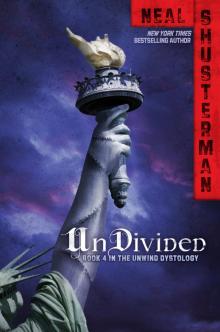 UnDivided
UnDivided UnBound
UnBound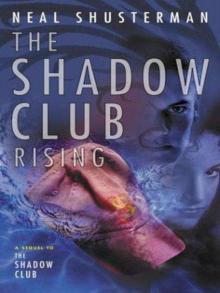 The Shadow Club Rising
The Shadow Club Rising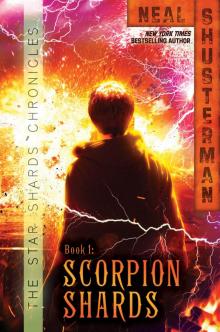 Scorpion Shards
Scorpion Shards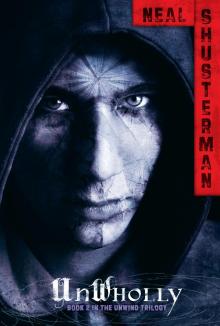 UnWholly
UnWholly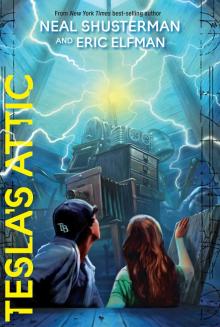 Tesla's Attic
Tesla's Attic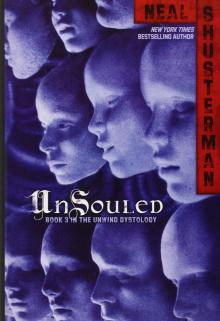 UnSouled
UnSouled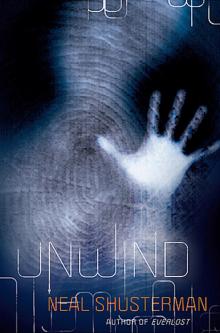 Unwind
Unwind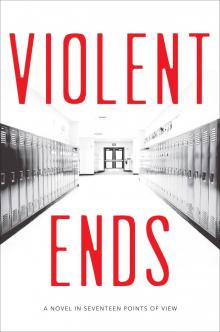 Violent Ends
Violent Ends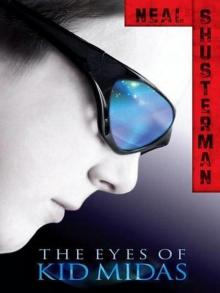 The Eyes of Kid Midas
The Eyes of Kid Midas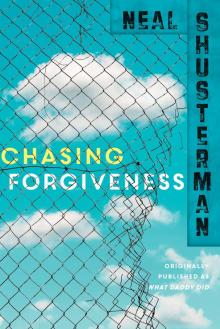 Chasing Forgiveness
Chasing Forgiveness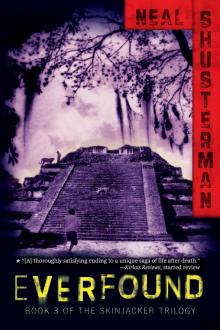 Everfound
Everfound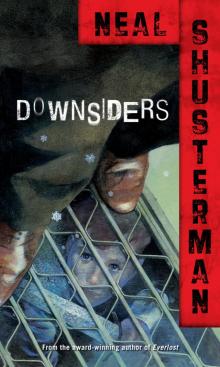 Downsiders
Downsiders The Schwa Was Here
The Schwa Was Here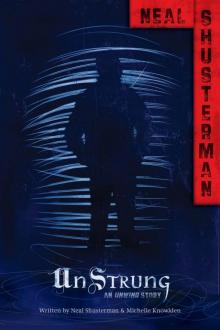 UnStrung
UnStrung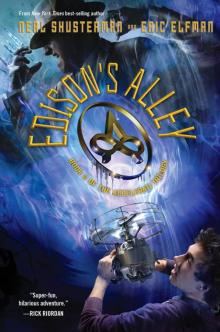 Edison's Alley
Edison's Alley Duckling Ugly
Duckling Ugly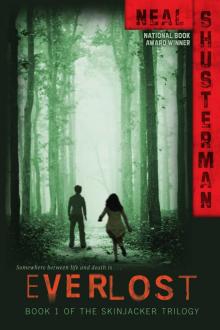 Everlost
Everlost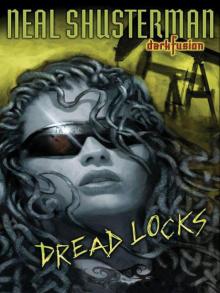 Dread Locks
Dread Locks Antsy Floats
Antsy Floats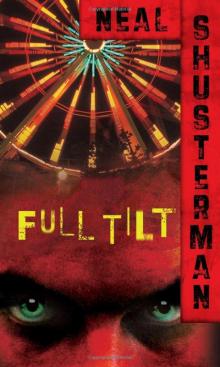 Full Tilt
Full Tilt Thunderhead
Thunderhead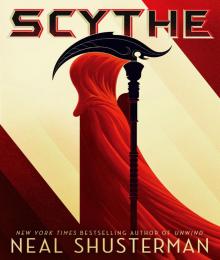 Scythe
Scythe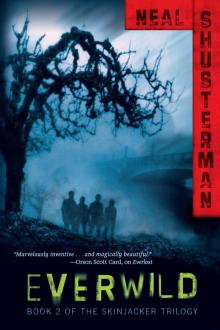 Everwild
Everwild Challenger Deep
Challenger Deep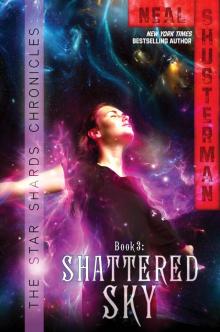 Shattered Sky
Shattered Sky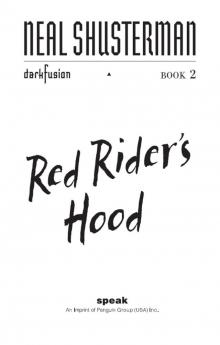 Red Rider's Hood
Red Rider's Hood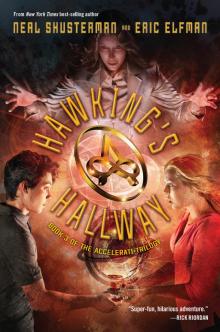 Hawking's Hallway
Hawking's Hallway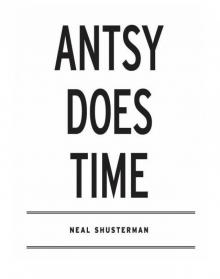 Antsy Does Time
Antsy Does Time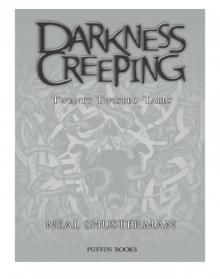 Darkness Creeping: Twenty Twisted Tales
Darkness Creeping: Twenty Twisted Tales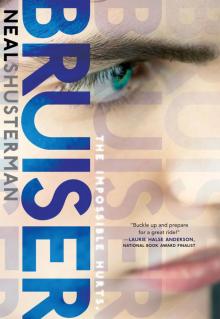 Bruiser
Bruiser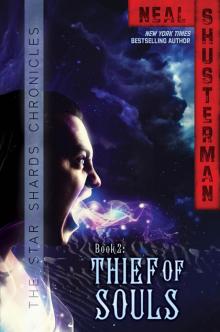 Thief of Souls
Thief of Souls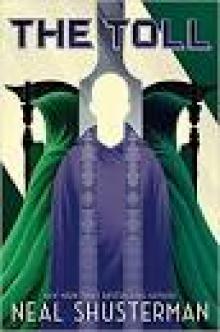 The Toll
The Toll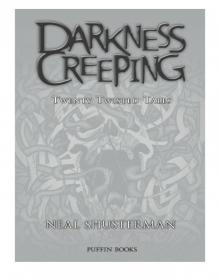 Darkness Creeping
Darkness Creeping Resurrection Bay
Resurrection Bay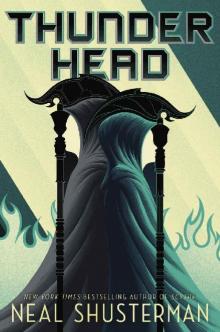 Thunderhead (Arc of a Scythe Book 2)
Thunderhead (Arc of a Scythe Book 2)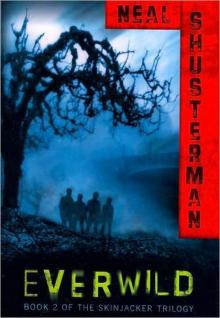 Everwild (The Skinjacker Trilogy)
Everwild (The Skinjacker Trilogy)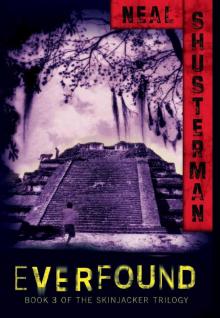 Everfound s-3
Everfound s-3 Edison’s Alley
Edison’s Alley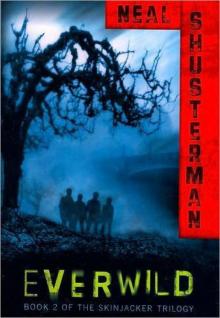 Everwild s-2
Everwild s-2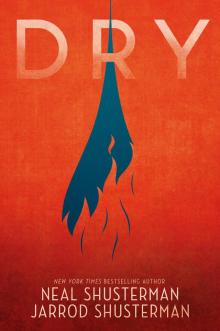 Dry
Dry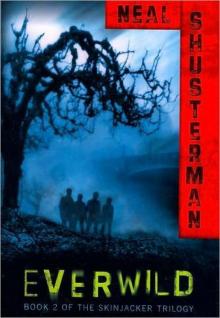 Skinjacker 02 Everwild
Skinjacker 02 Everwild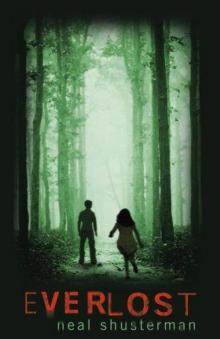 Everlost s-1
Everlost s-1